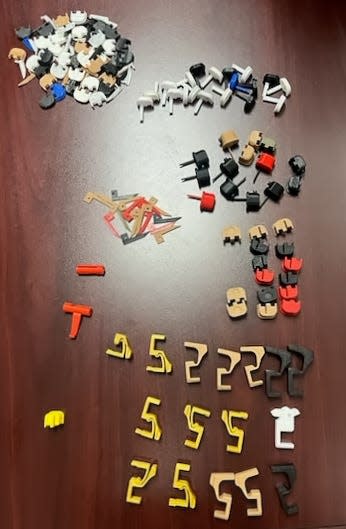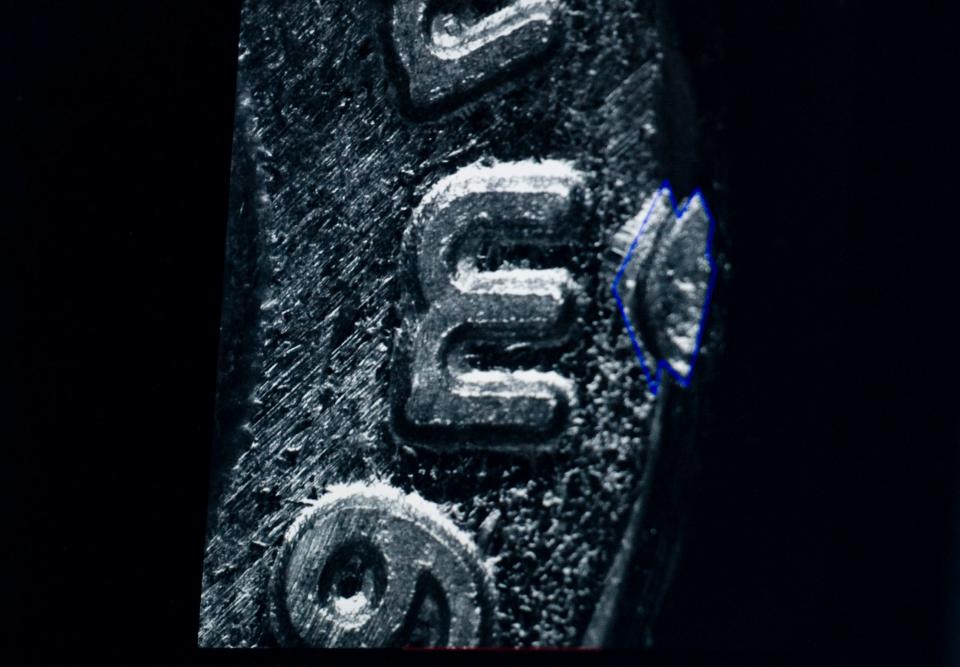As firearm crime center gets up and running, Evansville 3D-printing gun case goes federal
EVANSVILLE –– A man accused last month of manufacturing illegal machine gun conversion devices and other firearm components in Evansville will be tried in federal court, the U.S. Department of Justice announced this week.
It will be one of the first major cases spearheaded by the recently established Evansville-Vanderburgh Crime Gun Intelligence Center.
The case first garnered public attention on Jan. 31 when Evansville police claimed to have found a large cache of illegal, 3D-printed gun parts, firearm components and intact weapons at an Evansville home and in a nearby U-Haul truck.
Speaking Monday at a news conference, U.S. Attorney for the Southern District of Indiana Zachary Myers said the seizure of these devices and weapons constituted a “critical public safety priority.” Earlier this month, an Evansville Police Department detective told the Courier & Press that machine gun conversion devices had proven to be a growing problem across the city.
The Evansville man who is alleged to have manufactured the parts, commonly known as auto sears or “switches,” is identified in court records as 39-year-old Marquel D. Payne.
Evansville police first arrested Payne on Jan. 31 after officers searched his home, his truck and a U-Haul transport vehicle. A Vanderburgh County judge determined there was probable cause to hold Payne at the county jail on a $200,000 bond, though court records show local prosecutors dismissed charges against Payne on Feb. 5 as the southern district took up the case.
Shawn Chapman, a special agent with the Bureau of Alcohol, Tobacco and Firearms, authored a 9-page affidavit wherein he laid out the basis for charging Payne with several federal offenses: possession of a machine gun, possession of a firearm by a convicted felon and possession of an unregistered firearm.
A grand jury would later hand down an indictment charging Payne with those offenses, court records show.
According to Chapman’s affidavit, Payne came to the attention of police when detectives with the EPD’s Street Crimes Unit obtained information from two unnamed individuals indicating Payne had manufactured and offered to sell 3D-printed “Glock switches” and handmade firearms devoid of trackable serial numbers.
While the devices are technically known as auto sears, a “switch” converts a semi-automatic firearm into a fully automatic weapon. Homemade firearms lacking serial numbers are commonly referred to as “ghost guns” because they are difficult to trace.

On Jan. 31, the Street Crimes Unit and the Evansville-Vanderburgh Narcotics Joint Task Force surveilled Payne’s homein the 1400 block of Cedar Street, according to Chapman.
“Detectives watched a U-Haul truck that was backed up to the front door of the residence as items from the house began to be loaded onto the truck,” Chapman wrote in the affidavit. “Detectives also watched as Payne carried a box and a 3D printer to a white Ford pickup truck parked in front of 1411 Cedar Street.”
Police later pulled Payne over in the truck after he allegedly sped through a school zone near Diamond Avenue’s intersection with Kratzville Road. When Payne gave his consent for officers to search the vehicle, they allegedly located a BamBu Lab 3D printer in the back seat. A box with 3D-printing parts found nearby reportedly featured an inscription of a known alias for Payne: “Petey.”
“Anthony Payne was then released from the stop and proceeded to drive away,” Chapman wrote.
Later on Jan. 31, Evansville police pulled Payne over a second time near the Lloyd Expressway in connection with now-authorized search warrants. Police also searched Payne’s Cedar Street home. In total, investigators allegedly seized more than 60 devices, parts and weapons associated with illegal firearm manufacturing.
A list of those items compiled from court records illustrates the scope of Payne’s alleged operation:
63 Machine Gun Conversion Devices (MCDs)
9mm Ghost Gun
9mm ammunition
Pac West Arms 5.56 AR-15
Bambu Lab P1P 3D Printer
Printing Filament
Misc. Printed Pieces
3D-Printed Suppressor
9mm Ammunition
Unfinished (machine gun conversion device) parts
Methamphetamine
Marijuana
The seized drugs would later land an Evansville man in jail on narcotics charges, according to Vanderburgh County court records.
According to Chapman, Payne admitted during a police interview that the 3D printer belonged to him and that he had used it to manufacture “numerous” machine gun conversion devices.
“In his statement, it was apparent that Payne knew the devices were designed to convert a firearm into a fully automatic machine gun,” Chapman wrote. “Payne also admitted to 3D printing a non-serialized 9mm handgun grip and purchasing a lower parts kit, including a slide and barrel, which he used to build a 9mm pistol.”
A Courier & Press review of firearms websites shows it is relatively easy, and cheap, to procure parts kits that enable private citizens to construct homemade versions of popular Glock handguns. According to court records, Payne allegedly manufactures some of the parts in such a way that they would be difficult to identify on a standard Glock handgun.
A firearms expert with extensive knowledge of 3D-printed gun parts, who asked to remain anonymous, told the Courier & Press that evidence photos included as exhibits in Payne’s case showed “invisa-switch” devices alongside other 3D-printed gun parts.
The photos also showed standard machine gun conversion devices designed for Glock handguns in various states of completion and fully completed conversion devices for semi-automatic, AR-15-style rifles, according to the expert.
At the time Payne is alleged to have manufactured the parts, he had incurred felony convictions for escape, carrying a handgun without a license and criminal recklessness with a deadly weapon, court records show.
Case is emblematic of emerging trend in illegal gun cases
The 3D-printed parts and the 9mm “Ghost gun” at the center of Payne’s case have become an increasing problem for law enforcement in the nation’s major metro areas, including in Chicago and Indianapolis.
In September, a federal judge in Indianapolis sentenced 31-year-old man to seven-and-a-half years in prison after he pleaded guilty to possession of a machine gun. Prosecutors alleged that 31-year-old Micah Moore used 3D printers to manufacture switches, which he later sold for a profit.
A review of court records shows that federal prosecutions across the Midwest have pursued similar cases in recent months.
EPD Sgt. Michael Gray told the Courier & Press that officers had "sporadically" seized machine gun conversion devices since he joined the force in 2005. But it's becoming more common.
"We're usually just a little bit behind," he explained. "We're starting to see these more and more … They're not common yet, depending on what your definition of 'common' is."
Auto sears, or switches, disrupt how semi-automatic firearms typically fire. The devices prevent internal, mechanical components from limiting each individual trigger pull to the firing of just one round.
The result is a rapid fire, fully automatic weapon. The National Firearms Act allows for civilians to possess machine guns under very limited circumstances. But illegally converted machine guns have proliferated across the United States in recent years. Hundreds of videos of people firing such weapons have been posted online.
Crime Gun Intelligence Center vowes to coordinate state and local investigations
According to court records, Payne's case is in the early stages of discovery, during which his court-appointed defense attorney, Jake Warrum, will review evidence compiled by federal prosecutors.
U.S. Magistrate Judge Crystal S. Wildeman ordered Payne to be held in custody pending a March 7 hearing. Prosecutors have filed a motion to indefinitely detain Payne ahead of a future trial.
The case represents an early win for Evansville's recently established Crime Gun Intelligence Center. Late last year, local law enforcement announced that nearly $700,000 in federal funds would help get the program up and running.
This week, officials said that investment had borne fruit.
"This case is a result of teamwork and, with our agencies working together, we expect more cases like this," Vanderburgh County Prosecutor Diana Moers said. "We are ahead of criminal activity and are not simply reacting."

Moers' office applied for the federal grant, which will help fund the Evansville-Vanderburgh Crime Gun Intelligence Center for the next three years.
As part of the program, the Indiana State Police post in Evansville now houses a National Integrated Ballistics Information Network machine, which officials say can help investigators trace guns used in local crimes − or even further afield − by comparing data to a federal database.
In November, ATF Columbus Field Division Assistant Special Agent in Charge John Nokes claimed the newly established center made clear that Evansville-area law enforcement was committed to "using all available resources to reduce violent crime in your communities."
This article originally appeared on Evansville Courier & Press: Evansville 3D printing gun case moves to federal court

